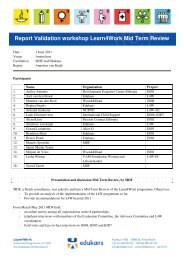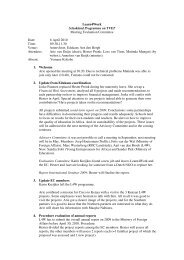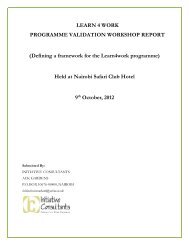DRAFT TECHNICAL AND VOCATIONAL EDUCATION AND ...
DRAFT TECHNICAL AND VOCATIONAL EDUCATION AND ...
DRAFT TECHNICAL AND VOCATIONAL EDUCATION AND ...
Create successful ePaper yourself
Turn your PDF publications into a flip-book with our unique Google optimized e-Paper software.
27<br />
the assessment of readiness for skill learning be part of programme development,<br />
depending of course on the type of programme.<br />
(f) Career counselling and planning need to be incorporated into vocational training<br />
programmes for young people; training should not focus only on present need but<br />
should broaden the future career perspectives of the young people.<br />
(g) Training infrastructure in most of Ghana’s vocational training institutions are<br />
generally poor. Training interventions need to incorporate investment in basic tools<br />
and equipment. One way in which Dutch civil society groups can assist with the<br />
provision of tools and equipment is to mobilize the donation of tools such as hand<br />
drills in good working condition. Such little donations can raise the productivity of<br />
informal sector workers several times.<br />
(h) The labour market in Ghana is a “difficult” one; to minimize the possibility of trainees<br />
going back to the street after training, it will be important for specific training needs<br />
assessment to be undertaken in developing skill training programmes. Labour market<br />
needs should be assessed for specific areas.<br />
(i) When it comes to the provision of skill training to economically disadvantaged<br />
people, the question is who bears the cost While economically disadvantaged<br />
groups need help, interventions must extract some amount of demonstrated<br />
commitment from prospective beneficiaries. Totally “free” forms of assistance are<br />
not only sustainable, they also attract the wrong people. For example, beneficiaries<br />
may be asked to find and register their sponsors. Provision can however be made for<br />
exceptional cases.<br />
(j) Some recommended areas of focus or niches that Dutch partners may consider are:<br />
i. Developing focused and integrated training programmes that equip people with<br />
small-scale agro-processing technologies and marketing skills in line with the<br />
national development goal of increasing manufacturing on the back of modern<br />
agriculture;<br />
ii. Skill training involving the transfer of appropriate technologies, such as the<br />
building of solar energy product, small windmills, and other renewable energy<br />
technologies.<br />
iii. Integrated skill training and entrepreneurship focusing on new areas as the design<br />
and production of product packaging materials using local raw materials.<br />
iv. Partnering with organisations serving the skill training needs of vulnerable and<br />
disadvantaged groups – such as the Ghana Federation of the Disabled and the<br />
Presbyterian Church’s Vocational Training for Females (VTF), and the Young<br />
Women Christian Association;<br />
v. TVET instructor training a dying area that needs special attention; such<br />
intervention will have multiplier effects and should be made accessible to private<br />
TVET institutions which hardly invest in instructor training.<br />
vi. General or specific advocacy work to get public officials, legislators, and<br />
politicians to give practical support to TVET promotion. The advocacy may be<br />
general or for specific interests such as gender and disability.<br />
CONCLUSION<br />
The TVET sector in Ghana faces many challenges. Foremost among those challenges<br />
is the pressure to provide skills training to the vast majority of young people who drop<br />
out of school early or are not able to continue formal education beyond basic







